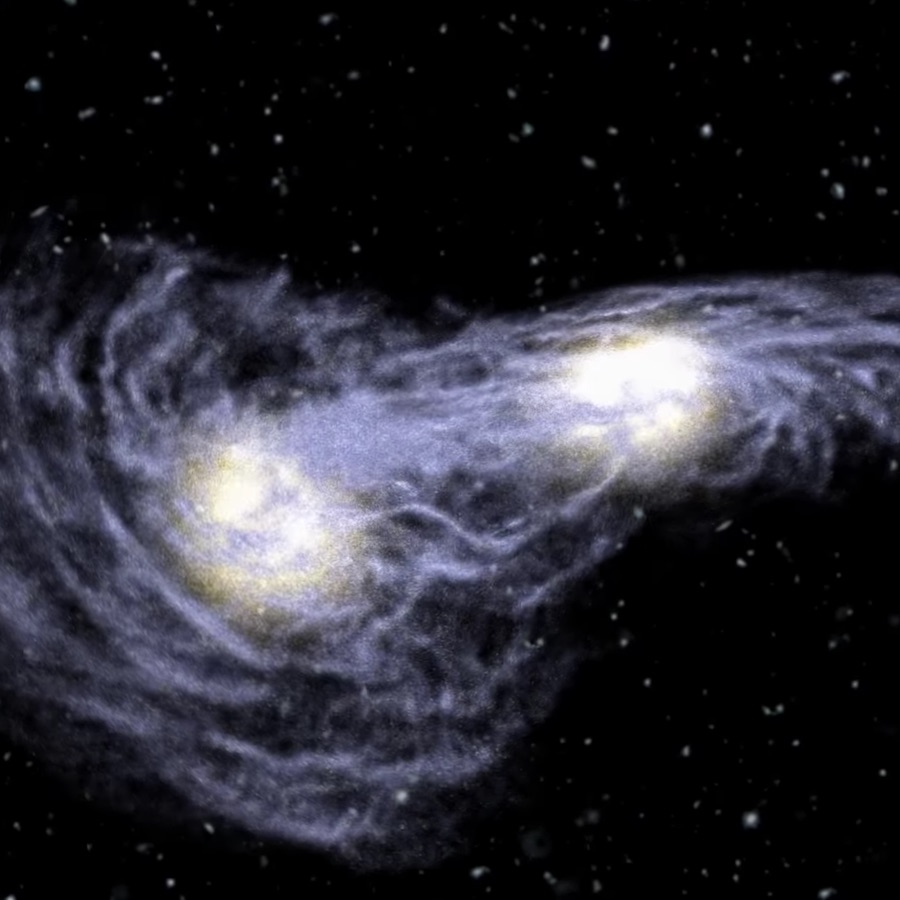In the vast expanse of the universe, the revelation that our cosmos harbors at least two trillion galaxies ignites a profound contemplation of existence itself. This staggering figure presents an opportunity to explore not only the physical dimensions of the universe but also the spiritual and philosophical teachings within the Baha’i Faith. The immensity of the cosmos invites myriad interpretations, reflecting our search for meaning, connection, and unity—all central tenets of Baha’i teachings.
At the outset, one must appreciate the sheer scale of this revelation. Each galaxy, teeming with billions of stars and countless celestial bodies, serves as a reminder of the magnificence and mystery that permeates creation. This multiplicity of galaxies parallels the diversity and richness of human experience, suggesting an intrinsic order and harmony within apparent chaos. The Baha’i Faith encourages adherents to view this vastness as a manifestation of divine will, inherently filled with purpose and guidance.
The concept of unity is paramount. The very existence of trillions of galaxies implies interconnectedness. Just as galaxies cluster in the universe, humanity—diverse in culture, belief, and tradition—can find commonality in spirituality. Baha’i teachings stress that all sentient beings are part of one family, sharing a divine origin. The cosmos, in its infinitude, reflects the potential for unity among mankind.
Moreover, the observation of the universe resonates with the Baha’i principle of progressive revelation. Baha’is believe that divine guidance has been revealed to humanity throughout history by a succession of prophets or Manifestations of God. Each one has offered insights suited to the capacity of humanity at that time, contributing to a comprehensive understanding of existence. Just as the universe continually evolves, so too does humanity advance through spiritual teachings. This perspective shapes an understanding of the harmonious relationship between the infinite cosmos and our personal journeys.
It is essential to reflect on the psychological and spiritual implications of contemplating an ever-expanding universe. The vastness of space often invokes feelings of insignificance; however, from a Baha’i viewpoint, this perception can be transformed into appreciation for human potential. The realization that we are part of a greater whole instills a sense of purpose. This aligns with the Baha’i emphasis on the potential for each individual to contribute positively to society, fostering an environment of collaboration, service, and compassion.
Furthermore, the inquiry into the universe invites us to grapple with profound existential questions: What is our place in the cosmos? What role does humanity play in this grand tapestry of existence? Such questions echo the Baha’i belief in the importance of searching for truth and knowledge. Baha’is are encouraged to cultivate their intellect, pursuit of understanding being a form of worship. The cosmos thus serves as both a backdrop and a vital participant in humanity’s quest for enlightenment.
Moreover, Baha’i teachings promote the idea of the oneness of religion and science. The exploration of galaxies can be seen as a scientific endeavor that can coexist with spiritual understanding. The empirical study of the universe does not negate faith; rather, it complements it. The discoveries made by astronomers and cosmologists can illuminate our spiritual insights, demonstrating the unity of knowledge. This synergy enhances the appreciation of the creator’s handiwork and the divine laws that govern existence.
The mere existence of two trillion galaxies beckons us to consider the possibility of life beyond our terrestrial realm. Baha’is hold an inclusive view of the universe, asserting that life may flourish elsewhere, potentially with its own forms of divine guidance. This perspective highlights the universal nature of spiritual truth, suggesting that divine revelation is not limited to Earth. By seeing the universe as a vast playground of creation, we cultivate an expansive vision that respects and honors all forms of life.
Equally intriguing is the notion of the aesthetic dimension of the universe. The splendor of galaxies—each with its unique formation, color, and luminosity—can inspire artistic expression and profound contemplation. Baha’i teachings encourage the appreciation of beauty in all its forms, transcending mere aesthetics to embrace the spiritual truths they embody. The contemplation of the galaxies thus becomes an artistic pilgrimage, fostering both personal growth and a deeper reverence for the creator.
As we delve deeper into the cosmos, we encounter the intricate laws of nature that govern celestial phenomena. From the formation of galaxies to the behavior of stars, these laws suggest an intelligent design imbued with purpose. The Baha’i Faith presents the idea that all creation is a manifestation of divine attributes, emphasizing that humanity has a responsibility to recognize, respect, and harness the natural world’s resources wisely. This stewardship is a vital aspect of Baha’i teachings, aligning our actions with the greater cosmic order.
In juxtaposition with the scientific exploration of the universe, the spiritual contemplation inspired by two trillion galaxies urges humanity to embrace humility. Recognizing our infinitesimal place in the cosmos cultivates a sense of awe. This humility is pivotal in grounding the lofty aspirations of the Baha’i Faith, reminding adherents that despite their divine potential, they are part of a larger cosmic narrative, interconnected through a divine purpose.
In conclusion, the revelation of two trillion galaxies serves not only as a testament to the grandeur of the creator but also as an impetus for deep philosophical reflection grounded in Baha’i teachings. The interplay of unity, purpose, knowledge, and beauty encapsulates the essence of human experience as woven into the fabric of the cosmos. Embracing the vastness of the universe encourages a pathway toward a harmonious existence, urging humanity to reflect on its responsibilities, cultivate connection, and strive for a higher understanding of both the universe and its divine origins.
